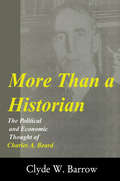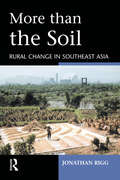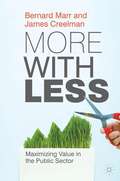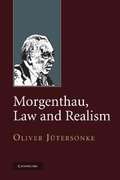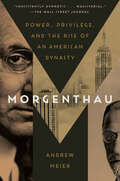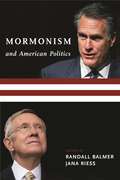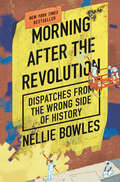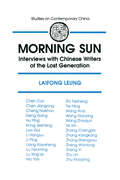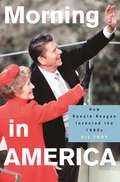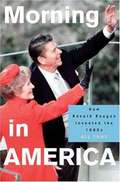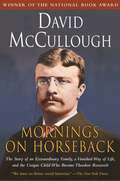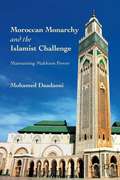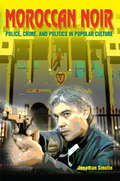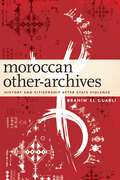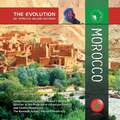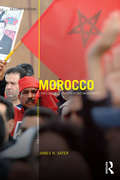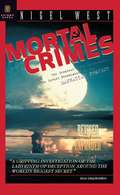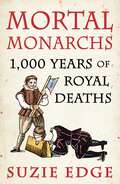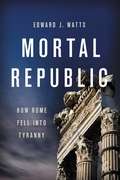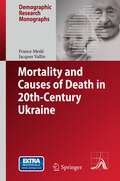- Table View
- List View
More than a Historian: The Political and Economic Thought of Charles A.Beard
by Clyde BarrowCharles A. Beard (1874-1948) was one of America's most influential historians and political scientists. He played a major role in founding the disciplines of history and political science, helped shape the teaching of social studies in the nation's public schools, and was one the nation's most popular public intellectuals. Yet in the second half of the twentieth century, Beard's reputation has been eroded by relentless criticism. Clyde W. Barrow argues that Beard's work has renewed relevance in light of recent theoretical debates about the new institutionalism, the crisis of the welfare state, and American foreign policy messianism. Barrow's takes Beard seriously as a political theorist, while challenging many misconceptions. For example, Beard's method of economic interpretation has been dismissed as Marxist, but Barrow carefully reconstructs the sources of Beard's thinking to demonstrate that his method owes more to historical and institutional economics and that his concept of state-society relations was in fact derived from Madison's Tenth Federalist. Barrow reconstructs Beard's theory of American political development using his concept of realistic dialectics, which viewed the clash between democracy (Jeffersonianism) and capitalism (Hamiltonianism) as the engine of American political development. During the 1930s, Beard suggested that the United States was making the transition to a higher form of social and industrial democracy that would supersede the contradiction of American political development. Notably, Beard was a critic of the New Deal and the liberal welfare state, because they failed to reconstruct the economic relations that reproduce inequalities of income, status, and power.Beard went on to voice his concern that at crucial junctures in American history, class struggle is diverted into international conflicts as popular leaders back down from a direct confrontation with the dominant capitalist elite. He analyzes American foreign policy as an extension of domestic economic policy and, in particular, a result of the failures of domestic economic policy. Beard's conception of American history plays itself out in a tragic cycle of imperialism and diversion that left him a disenchanted realist. This incisive study will be of interest to those intrested in the evolution of historical thinking.
More than the Soil: Rural Change in SE Asia
by Jonathan RiggMore than the Soil focuses on the social, cultural, economic and technological processes that have transformed rural areas of Southeast Asia. The underlying premise is that rural lives and livelihoods in this region have undergone fundamental change. No longer can we assume that rural livelihoods are founded on agriculture; nor can we assume that people envisage their futures in terms of farming. The inter-penetration of the rural and urban, and the degree to which rural people migrate between rural and urban areas, and shift from agriculture to non-agriculture, raises fundamental questions about how we conceptualise the rural Southeast Asia and the households to be found there.
More with Less
by Bernard Marr James CreelmanPublic sector organizations are about to enter one of the most challenging environments they have ever had to face as they bear much of the cost of the credit crunch. This timely book shows public sector leaders what they need to understand in order to be able to cope with these challenges.
Morgenthau, Law and Realism
by Oliver JütersonkeAlthough widely regarded as the 'founding father' of realism in International Relations, this book argues that Hans J. Morgenthau's legal background has largely been neglected in discussions of his place in the 'canon' of IR theory. Morgenthau was a legal scholar of German-Jewish origins who arrived in the United States in 1938. He went on to become a distinguished professor of Political Science and a prominent public intellectual. Rather than locate Morgenthau's intellectual heritage in the German tradition of Realpolitik, this book demonstrates how many of his central ideas and concepts stem from European and American legal debates of the 1920s and 30s. This is an ambitious attempt to recast the debate on Morgenthau and will appeal to IR scholars interested in the history of realism as well as international lawyers engaged in debates regarding the relationship between law and politics, and the history of international law.
Morgenthau: Power, Privilege, and the Rise of an American Dynasty
by Andrew MeierNEW YORK TIMES EDITORS&’ CHOICE • An &“epic and intimate&” (David M. Kennedy) portrait of four generations of the Morgenthau family, a dynasty of power brokers and public officials with an outsize—and previously unmapped—influence extending from daily life in New York City to the shaping of the American Century &“Magisterial . . . a vivid retelling of critical domestic and world events over two centuries.&”—Dr. Fiona HillAfter coming to America from Germany in 1866, the Morgenthaus made history in international diplomacy, in domestic politics, and in America&’s criminal justice system. With unprecedented, exclusive access to family archives, award-winning journalist and biographer Andrew Meier vividly chronicles how the Morgenthaus amassed a fortune in Manhattan real estate, advised presidents, advanced the New Deal, exposed the Armenian genocide, rescued victims of the Holocaust, waged war in the Mediterranean and Pacific, and, from a foundation of private wealth, built a dynasty of public service. In the words of former mayor Ed Koch, they were &“the closest we&’ve got to royalty in New York City.&” Lazarus Morgenthau arrived in America dreaming of rebuilding the fortune he had lost in his homeland. He ultimately died destitute, but the family would rise again with the ascendance of Henry, who became a wealthy and powerful real estate baron. From there, the Morgenthaus went on to influence the most consequential presidency of the twentieth century, as Henry&’s son Henry Jr. became FDR&’s longest-serving aide, his Treasury secretary during the war, and his confidant of thirty years. Finally, there was Robert Morgenthau, a decorated World War II hero who would become the longest-tenured district attorney in the history of New York City. Known as the &“DA for life,&” he oversaw the most consequential and controversial prosecutions in New York of the last fifty years, from the war on the Mafia to the infamous Central Park Jogger case. The saga of the Morgenthaus has lain half hidden in the shadows for too long. At heart a family history, Morgenthau is also an American epic, as sprawling and surprising as the country itself.
Mormonism and American Politics (Religion, Culture, and Public Life #18)
by Jana Balmer Randall RiessWhen Joseph Smith ran for president as a radical protest candidate in 1844, Mormons were a deeply distrusted group in American society, and their efforts to enter public life were met with derision. When Mitt Romney ran for president as a Republican in 2008 and 2012, the public had come to regard Mormons as consummate Americans: patriotic, family-oriented, and conservative. How did this shift occur?In this collection, prominent scholars of Mormonism, including Claudia L. Bushman, Richard Lyman Bushman, Jan Shipps, and Philip L. Barlow, follow the religion's quest for legitimacy in the United States and its intersection with American politics. From Brigham Young's skirmishes with the federal government over polygamy to the Mormon involvement in California's Proposition 8, contributors combine sociology, political science, race and gender studies, and popular culture to track Mormonism's rapid integration into American life. The book takes a broad view of the religion's history, considering its treatment of women and African Americans and its portrayal in popular culture and the media. With essays from both Mormon and non-Mormon scholars, this anthology tells a big-picture story of a small sect that became a major player in American politics.
Morning After the Revolution: Dispatches from the Wrong Side of History
by Nellie BowlesNEW YORK TIMES BESTSELLERFrom former New York Times reporter Nellie Bowles, a look at how some of the most educated people in America lost their minds—and how she almost did, too.As a Hillary voter, a New York Times reporter, and frequent attendee at her local gay bars, Nellie Bowles fit right in with her San Francisco neighbors and friends—until she started questioning whether the progressive movement she knew and loved was actually helping people. When her colleagues suggested that asking such questions meant she was &“on the wrong side of history,&” Bowles did what any reporter worth her salt would do: she started investigating for herself. The answers she found were stranger—and funnier—than she expected.In Morning After the Revolution, Bowles gives readers a front-row seat to the absurd drama of a political movement gone mad. With irreverent accounts of attending a multiday course on &“The Toxic Trends of Whiteness,&” following the social justice activists who run &“Abolitionist Entertainment LLC,&” and trying to please the New York Times&’s &“disinformation czar,&” she deftly exposes the more comic excesses of a movement that went from a sideshow to the very center of American life.Deliciously funny and painfully insightful, Morning After the Revolution is a moment of collective psychosis preserved in amber. This is an unmissable debut by one of America&’s sharpest journalists.
Morning Sun: Interviews with Chinese Writers of the Lost Generation
by Laifong Leung Jan WallsThis is a collection of interviews with 26 writers of China's "zhiqing" generation, relatively young artists who participated in the Cultural Revolution as teen-age Red Guards, suffered through the subsequent rustication of intellectual youth, and eventually returned to relatively normal lives, but always with a tragic hiatus haunting their formative years. While one goal of Professor Leung is to introduce to the West an important group of writers little-known outside China, she also aims to succeed, through the interviews, in providing a special perspective on the devastating political history of China since the 1970s years through the eyes of its keenest observers and in offering a perspective on the social, political and cultural milieu of the period.
Morning in America: How Ronald Reagan Invented the 1980's (Politics and Society in Modern America #47)
by Gil TroyDid America's fortieth president lead a conservative counterrevolution that left liberalism gasping for air? The answer, for both his admirers and his detractors, is often "yes." In Morning in America, Gil Troy argues that the Great Communicator was also the Great Conciliator. His pioneering and lively reassessment of Ronald Reagan's legacy takes us through the 1980s in ten year-by-year chapters, integrating the story of the Reagan presidency with stories of the decade's cultural icons and watershed moments-from personalities to popular television shows. One such watershed moment was the 1984 Los Angeles Olympics. With the trauma of Vietnam fading, the triumph of America's 1983 invasion of tiny Grenada still fresh, and a reviving economy, Americans geared up for a festival of international harmony that-spurred on by an entertainment-focused news media, corporate sponsors, and the President himself-became a celebration of the good old U.S.A. At the Games' opening, Reagan presided over a thousand-voice choir, a 750-member marching band, and a 90,000-strong teary-eyed audience singing "America the Beautiful!" while waving thousands of flags. Reagan emerges more as happy warrior than angry ideologue, as a big-picture man better at setting America's mood than implementing his program. With a vigorous Democratic opposition, Reagan's own affability, and other limiting factors, the eighties were less counterrevolutionary than many believe. Many sixties' innovations went mainstream, from civil rights to feminism. Reagan fostered a political culture centered on individualism and consumption-finding common ground between the right and the left. Written with verve, Morning in America is both a major new look at one of America's most influential modern-day presidents and the definitive story of a decade that continues to shape our times.
Morning in America: How Ronald Reagan Invented the 1980s
by Gil TroyA reassessment of Ronald Reagan's legacy takes us through the 1980s in ten year-by-year chapters, combining stories of the Reagan presidency and stories of the decade's cultural icons and watershed.
Mornings on Horseback: The Story of an Extraordinary Family, a Vanished Way of Life and the Unique Child Who Became Theodore Roosevelt
by David McCulloughThe National Book Award–winning biography that tells the story of how young Teddy Roosevelt transformed himself from a sickly boy into the vigorous man who would become a war hero and ultimately president of the United States, told by master historian David McCullough.Mornings on Horseback is the brilliant biography of the young Theodore Roosevelt. Hailed as “a masterpiece” (John A. Gable, Newsday), it is the winner of the Los Angeles Times 1981 Book Prize for Biography and the National Book Award for Biography. Written by David McCullough, the author of Truman, this is the story of a remarkable little boy, seriously handicapped by recurrent and almost fatal asthma attacks, and his struggle to manhood: an amazing metamorphosis seen in the context of the very uncommon household in which he was raised. The father is the first Theodore Roosevelt, a figure of unbounded energy, enormously attractive and selfless, a god in the eyes of his small, frail namesake. The mother, Mittie Bulloch Roosevelt, is a Southerner and a celebrated beauty, but also considerably more, which the book makes clear as never before. There are sisters Anna and Corinne, brother Elliott (who becomes the father of Eleanor Roosevelt), and the lovely, tragic Alice Lee, TR’s first love. All are brought to life to make “a beautifully told story, filled with fresh detail” (The New York Times Book Review). A book to be read on many levels, it is at once an enthralling story, a brilliant social history and a work of important scholarship which does away with several old myths and breaks entirely new ground. It is a book about life intensely lived, about family love and loyalty, about grief and courage, about “blessed” mornings on horseback beneath the wide blue skies of the Badlands.
Moroccan Mirages: Agrarian Dreams and Deceptions, 1912-1986
by Will D. SwearingenThis is an account of the economic policy in Morocco, a French Colony.
Moroccan Monarchy and the Islamist Challenge
by Mohamed DaadaouiThis book examines the factors behind the survival and persistence of monarchical authoritarianism in Morocco and argues that state rituals of power affect the opposition forces ability to challenge the monarchy.
Moroccan Noir
by Jonathan SmolinFacing rising demands for human rights and the rule of law, the Moroccan state fostered new mass media and cultivated more positive images of the police, once the symbol of state repression, reinventing the relationship between citizen and state for a new era. Jonathan Smolin examines popular culture and mass media to understand the changing nature of authoritarianism in Morocco over the past two decades. Using neglected Arabic sources including crime tabloids, television movies, true-crime journalism, and police advertising, Smolin sheds new light on politics and popular culture in the Middle East and North Africa.
Moroccan Other-Archives: History and Citizenship after State Violence
by Brahim El GuabliWinner, 2024 L. Carl Brown AIMS Book Prize in North African StudiesHonorable Mention, 2024 MELA Book AwardsFinalist, 2024 ASA Best Book PrizeMoroccan Other-Archives investigates how histories of exclusion and silencing are written and rewritten in a postcolonial context that lacks organized and accessible archives. The book draws on cultural production concerning the “years of lead”—a period of authoritarianism and political violence between Morocco’s independence in 1956 and the death of King Hassan II in 1999—to examine the transformative roles memory and trauma play in reconstructing stories of three historically marginalized groups in Moroccan history: Berbers/Imazighen, Jews, and political prisoners.The book shows how Moroccan cultural production has become an other-archive: a set of textual, sonic, embodied, and visual sites that recover real or reimagined voices of these formerly suppressed and silenced constituencies of Moroccan society. Combining theoretical discussions with close reading of literary works, the book reenvisions both archives and the nation in postcolonial Morocco. By producing other-archives, Moroccan cultural creators transform the losses state violence inflicted on society during the years of lead into a source of civic engagement and historiographical agency, enabling the writing of histories about those Moroccans who have been excluded from official documentation and state-sanctioned histories.The book is multilingual and interdisciplinary, examining primary sources in Amazigh/Berber, Arabic, Darija, and French, and drawing on memory studies, literary theory, archival studies, anthropology, and historiography. In addition to showing how other-archives are created and operate, El Guabli elaborates how language, gender, class, race, and geographical distribution are co-constitutive of a historical and archival unsilencing that is foundational to citizenship in Morocco today.
Morocco (The Evolution of Africa's Major Nations)
by Dorothy KavanaughFor centuries the Kingdom of Morocco, located in the northwest corner of Africa, has been a crossroads for trade between Europe and sub-Saharan Africa. Today this country is known for its exotic mix of Arab, African, and Western cultures and traditions. Since Morocco gained its independence in 1956, the country has struggled to emerge from its colonial past. The country's current ruler, the young King Mohammed VI, has taken steps toward developing democratic political institutions and protecting the human rights of Moroccan citizens. Many experts believe that if Morocco succeeds in achieving its goal of a more modern and stable society, it may serve as an example for African and Arab countries alike.
Morocco: Challenges to tradition and modernity (The Contemporary Middle East)
by James N. SaterThe first edition of Morocco was published one year before the mass protests of the Arab Spring rocked the Moroccan state. Post-Arab Spring, the country has a new constitution and government, but the state remains uncompromising on any true reform of the monarchy’s claims to power. This new edition provides an introductory overview of the history, contemporary politics, economy, and international relations in Morocco and offers an examination of the challenges to tradition and modernity in the post-colonial state. It has been revised and updated to include analysis of the country’s evolving politics in the years following the Arab Spring, and the consequences this has had for the country’s traditional monarchy. It pays particular attention to the new constitution, the policies of the new Islamist-led government, and it includes an analysis of Morocco’s foreign policy in the post-Arab Spring regional context. Drawing on key academic texts, the author provides a detailed analysis of Morocco, focusing on issues such as: • Morocco’s role within the region • Trade policies with Europe • Migration • Morocco’s Western Sahara policy • Ways of dealing with Political Islam • The extent to which European influence has affected Moroccan society Easily accessible to non-specialists, practitioners, and upper level undergraduate students, the book will be essential reading for those working in the fields of North African studies, International Relations and Middle East studies.
Mortal Crimes: The Soviet Penetration of the Manhattan Project
by Nigel WestNigel West has studied the recently revealed documents about Soviet espionage against the Western Allies during and after World War II and has for the first time painted the complete picture of how the Soviet Union stole the secrets of the atomic bomb. <P><P>The investigations by the British, Canadian, and US Military counterintelligence services through the Venona intercepts are placed in proper context and made intelligible by a master espionage history writer. What is revealed is the extent of the penetration by the NKVD and KGB of the most secret technologies of the era and how the West protected itself. A new and revised edition.
Mortal Gods: Science, Politics, and the Humanist Ambitions of Thomas Hobbes
by Ted H. MillerAccording to the commonly accepted view, Thomas Hobbes began his intellectual career as a humanist, but his discovery, in midlife, of the wonders of geometry initiated a critical transition from humanism to the scientific study of politics. In Mortal Gods, Ted Miller radically revises this view, arguing that Hobbes never ceased to be a humanist. While previous scholars have made the case for Hobbes as humanist by looking to his use of rhetoric, Miller rejects the humanism/mathematics dichotomy altogether and shows us the humanist face of Hobbes’s affinity for mathematical learning and practice. He thus reconnects Hobbes with the humanists who admired and cultivated mathematical learning—and with the material fruits of Great Britain’s mathematical practitioners. The result is a fundamental recasting of Hobbes’s project, a recontextualization of his thought within early modern humanist pedagogy and the court culture of the Stuart regimes. Mortal Gods stands as a new challenge to contemporary political theory and its settled narratives concerning politics, rationality, and violence.
Mortal Gods: Science, Politics, and the Humanist Ambitions of Thomas Hobbes (G - Reference, Information and Interdisciplinary Subjects)
by Ted H. MillerAccording to the commonly accepted view, Thomas Hobbes began his intellectual career as a humanist, but his discovery, in midlife, of the wonders of geometry initiated a critical transition from humanism to the scientific study of politics. In Mortal Gods, Ted Miller radically revises this view, arguing that Hobbes never ceased to be a humanist. While previous scholars have made the case for Hobbes as humanist by looking to his use of rhetoric, Miller rejects the humanism/mathematics dichotomy altogether and shows us the humanist face of Hobbes’s affinity for mathematical learning and practice. He thus reconnects Hobbes with the humanists who admired and cultivated mathematical learning—and with the material fruits of Great Britain’s mathematical practitioners. The result is a fundamental recasting of Hobbes’s project, a recontextualization of his thought within early modern humanist pedagogy and the court culture of the Stuart regimes. Mortal Gods stands as a new challenge to contemporary political theory and its settled narratives concerning politics, rationality, and violence.
Mortal Monarchs: 1000 Years of Royal Deaths
by Suzie Edge'A brilliant, funny and thought-provoking book' - Jonn Elledge'Compelling, provocative, and utterly brilliant' - Dr Estelle Paranque How the monarchs of England and Scotland met their deaths has been a wonderful mixture of violence, infections, overindulgence and occasional regicide. In Mortal Monarchs, medical historian Dr Suzie Edge examines 1,000 years of royal deaths to uncover the plots, accusations, rivalries, and ever-present threat of poison that the kings and queens of old faced.From the "bloody" fascinating story behind Oliver Cromwell's demise and the subsequent treatment of his corpse and whether the arrow William II caught in the chest was an accident or murder, to Henry IV's remarkable skin condition and the red-hot poker up Edward II's rear end, Mortal Monarchs captivates, grosses-out and informs.In school many of us learned the dates they died and who followed them, but sadly never heard the varied - and oft-gruesome - way our monarchs met their maker. Featuring original medical research, this history forms a rich record not just of how these people died, but how we thought about and treated the human body, in life and in death.
Mortal Monarchs: 1000 Years of Royal Deaths
by Suzie Edge'A brilliant, funny and thought-provoking book' - Jonn Elledge'Compelling, provocative, and utterly brilliant' - Dr Estelle Paranque How the monarchs of England and Scotland met their deaths has been a wonderful mixture of violence, infections, overindulgence and occasional regicide. In Mortal Monarchs, medical historian Dr Suzie Edge examines 1,000 years of royal deaths to uncover the plots, accusations, rivalries, and ever-present threat of poison that the kings and queens of old faced.From the "bloody" fascinating story behind Oliver Cromwell's demise and the subsequent treatment of his corpse and whether the arrow William II caught in the chest was an accident or murder, to Henry IV's remarkable skin condition and the red-hot poker up Edward II's rear end, Mortal Monarchs captivates, grosses-out and informs.In school many of us learned the dates they died and who followed them, but sadly never heard the varied - and oft-gruesome - way our monarchs met their maker. Featuring original medical research, this history forms a rich record not just of how these people died, but how we thought about and treated the human body, in life and in death.
Mortal Monarchs: 1000 Years of Royal Deaths
by Suzie EdgeA humorous deep-dive into the varied - and oft-gruesome - deaths of the King and Queens of England and Scotland.How the monarchs of England and Scotland met their deaths has been a wonderful mixture of violence, infections, overindulgence and occasional regicide. In Mortal Monarchs, medical historian Dr Suzie Edge examines 1,000 years of royal deaths to uncover the plots, accusations, rivalries, and ever-present threat of poison that the kings and queens of old faced.From the "bloody" fascinating story behind Oliver Cromwell's demise and the subsequent treatment of his corpse and whether the arrow William II caught in the chest was an accident or murder, to Henry IV's remarkable skin condition and the red-hot poker up Edward II's rear end, Mortal Monarchs captivates, grosses-out and informs.In school many of us learned the dates they died and who followed them, but sadly never heard the varied - and oft-gruesome - way our monarchs met their maker. Featuring original medical research, this history forms a rich record not just of how these people died, but how we thought about and treated the human body, in life and in death.(P) 2022 Headline Publishing Group Ltd
Mortal Republic: How Rome Fell into Tyranny
by Edward J. WattsA new history of the Roman Republic and its collapse In Mortal Republic, prize-winning historian Edward J. Watts offers a new history of the fall of the Roman Republic that explains why Rome exchanged freedom for autocracy. For centuries, even as Rome grew into the Mediterranean's premier military and political power, its governing institutions, parliamentary rules, and political customs successfully fostered negotiation and compromise. By the 130s BC, however, Rome's leaders increasingly used these same tools to cynically pursue individual gain and obstruct their opponents. As the center decayed and dysfunction grew, arguments between politicians gave way to political violence in the streets. The stage was set for destructive civil wars--and ultimately the imperial reign of Augustus. The death of Rome's Republic was not inevitable. In Mortal Republic, Watts shows it died because it was allowed to, from thousands of small wounds inflicted by Romans who assumed that it would last forever.
Mortality and Causes of Death in 20th-Century Ukraine
by Jacques Vallin France Meslé Vladimir Shkolnikov Sergei Adamets Serhii PyrozhkovThe Ukraine faced two very different kinds of health crises during the twentieth century. First, in the 1930s and 1940s, famine, war and political upheaval caused massive population losses. Previous evaluations of overall losses have given an idea of the scale of these catastrophes but do not distinguish between crisis mortality, birth shortfall and loss through emigration. Based on a painstaking work of reconstitution, this study is the first to provide a detailed estimation of the hecatomb in terms of number of deaths and life expectancy. The famine of 1933 was alone responsible for the deaths of 2.6 million Ukrainians and reduced male and female life expectancies to 7 and 11 years respectively. Once the crises of the 1930s and 1940s were over, the earlier trend in health resumed and mortality declined steadily until the 1960s. At this point, however, a new type of crisis appeared that caused a sustained reversal in the existing trends. Life expectancy for women stopped increasing altogether, while that for men began a relentless year on year regression. Notwithstanding the confusing picture created by the fluctuations of the 1980s and 1990s, the long-term trend is to further deterioration. To understand the factors involved, this study analyses in detail the combined effects of different causes of death at different ages.
